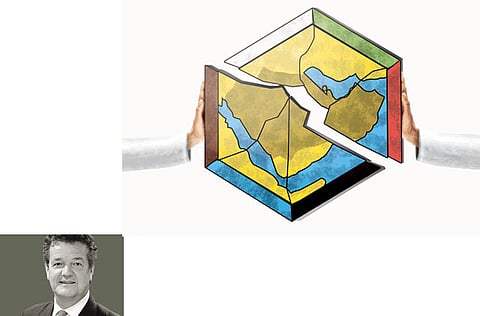Contract between ruled and ruler needs revision
Prince Turki calls for a unified military command and new Representational Council with elected members in the GCC

Unofficial readiness to reform the creaking organisation of the Gulf Cooperation Council (GCC) surfaced at the recent Gulf Research Meeting organised earlier this month by the Gulf Research Council and Cambridge University. For many years the GCC has been seen as a lacklustre organisation which allowed the six member states to meet and coordinate their mutual requirements, without very much political commitment to each other or the wider region.
But in more recent years, the GCC, and Saudi Arabia in particular, has taken a more effective regional role, such as fronting reconciliation talks between Hamas and Fatah. Then the revolutions of the Arab Spring took the whole Arab world by surprise, but in particular badly wrong-footing the increasingly incompetent Arab League.
On Libya, the GCC stepped into the hole left by the silent Arab League, and supported a no-fly zone, which was then supported by the Arab League, and then the United Nations was able to quote regional support for the actions that the US, France and the UK wanted to take against Muammar Gaddafi's regime.
But in Cambridge this month, Prince Turki Al Faisal, the director of the King Fahd Centre for Research and Islamic Studies, took a bold line in favour of a lot more self-examination by Gulf states. Prince Turki, who had been head of Saudi Arabia's intelligence agency, and was later appointed as Saudi ambassador to the US and the UK, described to the Gulf Research Meeting how Saudi Arabia is an Arab and Muslim state, and how the Quran and Sunna are its constitution.
But he also made clear that the relationship between the ruler and the people is spelt out in the beya, which Prince Turki described as the contract between the ruler and the ruled under which, in return for the people's support, the ruler provides protection. And he was specific that there has to be a mechanism to handle problems when this relationship fails: "We have had the experience of removing one king," Prince Turki said.
In case he had not been clear enough, Prince Turki returned to this theme when he said that "the rulers will rule as long as they satisfy the people. The ruler is the servant of the people". Looking around the region, he commented that Morocco is a leading light in moving to more engagement with the people in the process of government.
Prince Turki spoke of the major issues that Saudi Arabia has had to cope with in recent years as the experience of centuries was turned on its head. "The kingdom has a long history of warfare, disease and poverty, and waves of outward immigration as the population of the peninsula has moved elsewhere. But for the past few decades we have had to cope with the exact opposite. For the first time in 1,000 years that process has been reversed and we can now offer livelihoods provided by, with and for the people." Prince Turki was clear that there had been some delay in implementing the basic principles as contained in Saudi Arabia's Basic Law, and was blunt about the requirement to have more participatory government, throughout the kingdom, at local, regional and at Shura Council with elected members.
Looking at the state of the GCC, Prince Turki was not at all complacent and said that the GCC could benefit immediately from two obvious reforms. The first was a unified military command, which would also have the important benefit of rationalised arms purchases in the GCC. The second was the establishment of a Representative Council with members from all six member states, and authority of some aspects of GCC life. This council should be seen as a first step to broader popular responsibility in GCC government.
In private discussions after his talk, several Gulf delegates pointed out that such moves would greatly strengthen Saudi influence in the GCC and weaken the five smaller members' control of events.
The wide-ranging support form all levels of society for the revolutions of the Arab Spring make this season of change very different from previous times of change in the Arab world. Prince Turki summarised previous changes as being either military coups in the immediate post-colonial period, or the arrival of Arab Socialist governments, neither of which affected the people very much. The population at large remained calm during these changes and their livelihoods were not much affected. But he said that this time the popular nature of the uprising has made the changes far deeper.
Commenting on both Libya and Syria, Prince Turki was outspoken on the need to end the killing. "Ending the conflict in Libya should be everybody's priority, rather than maintaining the present war. Let us have peace in Libya."
On Syria, he said that it is wrong for the president of Syria to say that he holds the interests of the people at heart when the army and police are killing people. "Syrians killing Syrians is deplorable," said Prince Turki, to wide applause in the plenary session of the Gulf Research Meeting.



